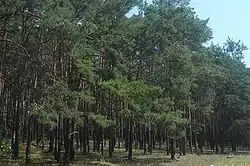sils
Latvian

Sils
Etymology
From an earlier *silas, from Proto-Baltic *šil-, from Proto-Indo-European *sḱl̥-, the zero grade of *skel-, *sḱel-, perhaps from *kel-, *ḱel- (“to dry up”) (whence also Latvian kalst “to dry up”) + *s- (an s-mobile), or perhaps by metathesis from *ks-el-, from *ḱes- (< *ḱs-eH-), *ḱsā- (“burned, dried up”) (whence Ancient Greek ξερός (xerós), ξηρός (xērós) “dry” and Sanskrit क्षायति (kṣā́yati) “to burn”). The meaning change was probably “dry, sandy place” > “forest on a dry, sandy place” > “pinewood, pine forest.” Cognates include Lithuanian šìlas, Ancient Greek σκέλλω (skéllō, “to dry up”).[1]
Pronunciation
- IPA(key): [sils]
Noun
sils m (1st declension)
Declension
Declension of sils (1st declension)
Derived terms
References
- Karulis, Konstantīns (1992), “sils”, in Latviešu Etimoloģijas Vārdnīca (in Latvian), Rīga: AVOTS, →ISBN
Volapük
This article is issued from Wiktionary. The text is licensed under Creative Commons - Attribution - Sharealike. Additional terms may apply for the media files.